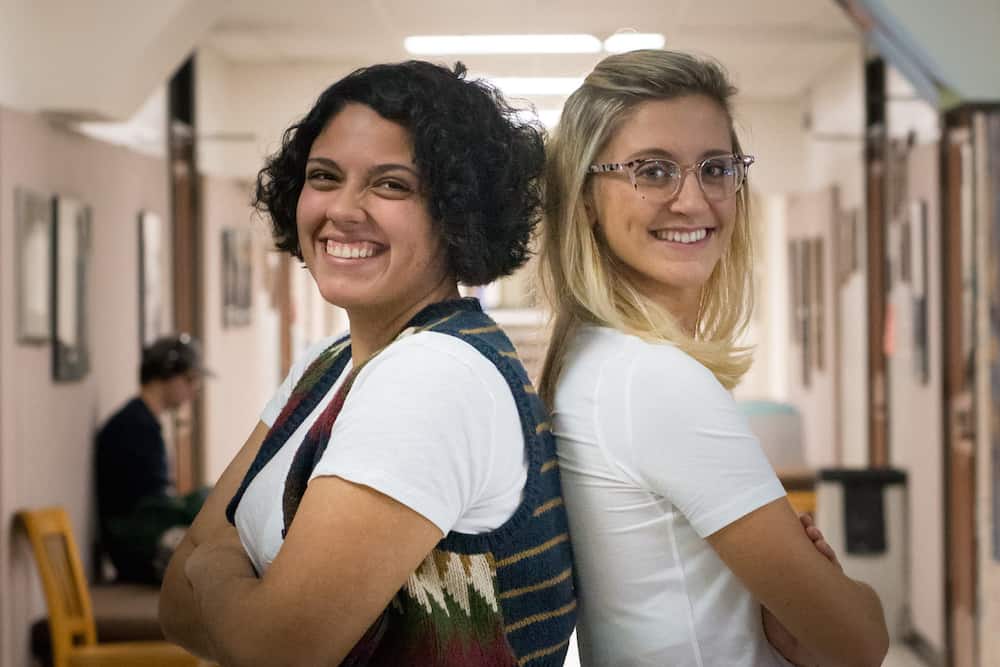Social work master’s student Sarah Kate Gottschalk and senior Yahaira Pamela Morales Castro share their passion for advocating for the Latino community. They are also IE Kuhn Scholars, and this Fall semester received an IE/Social Work travel grant that allowed them to attend the 2017 Latino/a Behavioral Health Conference: The Evolution of Mental Health Services and Social Justice in Chicago.
What was the purpose of the conference?

Gottschalk: The conference began in 1991 to promote mental health awareness in the Latino/a community in the greater Chicago area. This daylong event was attended by roughly 200 participants, most of whom were mental health practitioners, social services professionals, educators, and students from the area. The main goals of the conference were to increase cultural competence, capacity for effective service delivery, and awareness of service barriers in the Latino/a community.
Morales Castro: The conference offered a broad perspective on what it could mean to provide “culturally responsive mental health services,” specifically focused on the Latinx community. This year’s theme of social justice was a reminder to all participants that it is essential to strongly advocate for our immigrant and underserved populations, especially under the current administration.
Share something you learned.
Gottschalk: I attended a breakout session on the impact of trauma on children and adolescents, a theme that is directly applicable to the populations with whom I wish to work as a mental health professional. The material also resonated with a course I took over the summer on the neurobiology of attachment. I also attended a workshop about EMDR, an integrative psychotherapeutic approach to treating trauma that I have always been interested in, but didn’t know much about.
Morales Castro: I also attended the breakout session on the impact of trauma on children and adolescents. Though the concept of “trauma” comes up often in my social work classes, I personally haven’t had the opportunity to dive into it. I could go on and on about what I learned in this session, but basically it informed me on the process of creating a trauma-informed culture (not just in social work, but in schools, hospitals, etc.), and got me thinking about behavior in children through the metaphor of an iceberg. Over water, we only see the very tip, which is the behavior of the child. But under water, the iceberg is much larger, and we need to consider the child’s emotions, core beliefs, thoughts, and experiences. As someone who wants to work with youth, this experience was very valuable to my future practice and continuing learning. My field internship next semester may be with a trauma-informed agency, and this session gave me a foundation of knowledge on what this could look like and how it could benefit youth in more settings.
What was your main takeaway?
Gottschalk: We were all energized and inspired by an incredible keynote presentation, “Criminalizing Hope: The Impact of Aggressive Immigration Enforcement on Latino/as” by Nayeli Chavez-Duenas and Hector Adames of the Chicago School of Professional Psychology. They emphasized seven psychological strengths of Latino/as that they have consistently found when working with this population: determination, adaptability, strong work ethic, connectedness to others, collective emotional expression, courage to resist, and most importantly, esperanza, which means “radical hope.” Their presentation concluded with everyone on their feet, singing, dancing and clapping as we celebrated the resilience of this community.
Morales Castro: For me, the conference keynote served as a reminder of my own strengths as an undocumented Latina student in her fourth year of college. As someone passionate about working with undocumented immigrants, the keynote was also a wake-up call to apply social work strengths-based lens and tools in my future work with this community. And finally, it made me think about the shared work that could be done with professionals from other fields with whom we may overlap in medical settings: How can a social worker team up with a doctor to address all the needs of a client/patient? How can a nurse and doctor have a culturally informed approach to their patients? How do we provide culturally responsive mental health services, especially in environments of such diverse and rapidly changing cultures?
The IE (Intellectual Entrepreneurship) Pre-Graduate School Internship connects undergraduates with faculty and veteran graduate students in their field to explore the unique aspects of graduate study such as conducting research, writing for scholarly audiences, participating in seminars, and serving as teaching and research. The Pre-Graduate School Internship is available to all undergraduates at UT-Austin.


